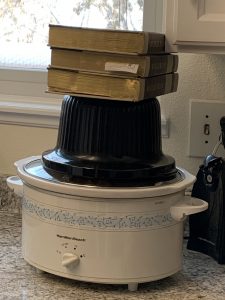I walked in the kitchen recently and was greeted with a most unusual culinary sight: three encyclopedias precariously perched on an upside-down bowl atop a slow cooker. My wife is quite creative in the kitchen, but this cooking contraption was somewhat unprecedented.
 Turns out the turkey breast she had in the slow cooker was just a little too tall for the lid to firmly seat, hence the employment of another vessel plus a few heavy encyclopedias to hold the lid down. When she explained her engineering feat later, she observed how funny it would be if a novice cook concluded this was the proper way to cook a turkey!
Turns out the turkey breast she had in the slow cooker was just a little too tall for the lid to firmly seat, hence the employment of another vessel plus a few heavy encyclopedias to hold the lid down. When she explained her engineering feat later, she observed how funny it would be if a novice cook concluded this was the proper way to cook a turkey!
While my dear wife’s solution made perfect sense in context, it’s not universal cooking counsel. How many behaviors and mannerisms do we pick up unconsciously in life but never think to question? For example, I was so accustomed to seeing my hurried father unbuckle his seatbelt and open the door to exit—before the vehicle was even at a full stop— that I adopted the same habit. It took someone who hadn’t see that modeled to flag the unusual behavior for me.
 While we pick up some good habits unconsciously, there often are dysfunctional behaviors in the mix as well. Some of these hurt us or others, and can pose a stumbling block in life.There’s a reason for the term “blind spots.” We all have them, and more often than not, it takes someone else to point one out. Cultivating honest, caring relationships paves the way out of dysfunctional living. Left to ourselves, we will keep doing the same things without thinking.
While we pick up some good habits unconsciously, there often are dysfunctional behaviors in the mix as well. Some of these hurt us or others, and can pose a stumbling block in life.There’s a reason for the term “blind spots.” We all have them, and more often than not, it takes someone else to point one out. Cultivating honest, caring relationships paves the way out of dysfunctional living. Left to ourselves, we will keep doing the same things without thinking.
In addition to vulnerable relationships with friends and family, bringing God into every part of our lives offers us fresh perspectives. The Holy Spirit will lead us if we are willing to listen and follow (see Psalm 32:8-9). God wants to talk to us; He is invested in our freedom from harmful behavior. David wrote in Psalm 16, “You will make known to me the path of life,” and in Psalm 23 he describes the Good Shepherd who will lead us in the paths of righteousness for His name’s sake. When we are wholly submitted to God, we’ll be willing to let Him show us things about ourselves through interactions with others, perhaps even via strangers.
 Once God makes us aware of something we’re doing that isn’t life-giving, whether directly or through another person, stop and ask Him, “Why am I doing this?” It could be that we’re just copying someone else’s behavior, as I did in the car example. Or the Holy Spirit may reveal to us that we are believing a lie. One of His jobs is to “guide us into all truth” (John 16:13), because knowing the truth sets us free (John 8:32).
Once God makes us aware of something we’re doing that isn’t life-giving, whether directly or through another person, stop and ask Him, “Why am I doing this?” It could be that we’re just copying someone else’s behavior, as I did in the car example. Or the Holy Spirit may reveal to us that we are believing a lie. One of His jobs is to “guide us into all truth” (John 16:13), because knowing the truth sets us free (John 8:32).
You don’t need encyclopedias to cook your turkey. You don’t need to follow poor examples or live a dysfunctional life. God can do wonders in response to your humility and an earnest desire to see what you don’t see!


Hi, guys!
This is good!
Nate and I are practiced at this, but this is a good reminder to be mindful of it more often.
And tell Carrie that I have done the same thing while trying to keep the artichokes down. (Although not with books!)
I am looking forward to reading more.
And wondering how I found this?
So happy to see it’s really you!